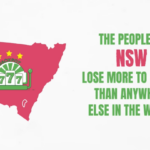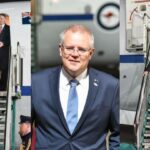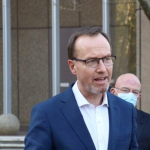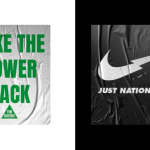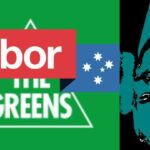A System in Crisis: Socialist Alliance NSW Candidate Rachel Evans on Radical Solutions
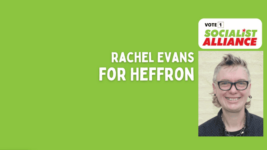
Transformed by the multiple crises that have altered many aspects of life since the last NSW election in early 2019, it’s a very different state that will approach the ballot box this March: one that has experienced a drawn-out pandemic, multiple floods and devastating wildfires.
NSW is today weary from the neoliberal policies rolled out by successive Liberal Nationals governments dating back to O’Farrell, who took power in 2011. And local communities are hesitant in considering that a likely post-election Labor government will bring necessitated change.
Indeed, a turning away from the major parties marked both the 2022 federal and Victorian elections, as voters favoured progressive candidates, who were willing to address the escalating climate emergency and increasing government corruption.
While, enacted last February, the Perrottet government’s harsh anti-protest regime, which was waved through with bipartisan approval, is indicative of the direction the majors are planning to take in relation to climate: shutting down its defenders, so fossil fuel business can prevail as usual.
The socialist vote
In the lead up to the May 2022 federal election, there was a sense of pending change as multiple teal independents were challenging blue ribbon seats, which a sizable number took out, while the Australian Greens cleaned up in the Senate, taking balance of power.
And this shift towards progressive politicians, with its key focus on climate, was further apparent at the Victorian ballot last November. And that state’s vote was also characterised by a significant rise in the socialist vote.
The growth in Victorians voting for socialist parties has been put down to a shift away from Labor, which resulted in a significant swing towards left wing parties, which, in some seats, saw close to a tenth of all votes going to socialists.
A people’s government
Socialist Alliance candidate Rachel Evans is running in the NSW seat of Heffron in the March state election.
An ardent social justice activist, Evans has been a prominent voice in the campaigns for climate justice, police reform and for greater allocation of affordable and public housing.
Evans considers the recent period of mounting crises has exposed the weakness in the capitalist system, with its tilt towards privatisation and fossil fuel subsidies, and this has resulted in the swing towards progressives committing to social change.
The SA candidate expects that, like in Victoria, there will be a similar shift towards socialist parties, like hers, in this state, as younger voters are beginning to understand that rather than representing the people, those in power are more interested in protecting the billionaire class.
Sydney Criminal Lawyers spoke to Socialist Alliance candidate Rachel Evans about the global turn to cracking down on climate defenders, the drastic need for more affordable housing in this state, and how First Nations empowerment won’t be achieved via token gestures.
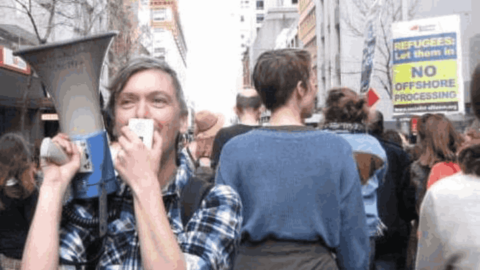
Rachel, you’re running in the inner city seat of Heffron in the upcoming NSW election for Socialist Alliance. One of the key political issues in this state at present are the protest laws the Perrottet government enacted last April.
This anti-protest regime involves draconian penalties for those partaking in unauthorised protests. And in December, Violet Coco became the first victim of these laws.
What’s your take on the crackdown on protest?
The anti-protest laws were introduced in the context of an international crackdown against environmental activists.
This started in the UK. But the US, Canada and Australia have also introduced laws to target environment activists that are taking direct action, sitting down on roads and gluing hands onto parliaments.
These courageous environmentalists have been taking these decisive actions against the government’s pro-coal and pro-gas policies.
These anti-protest laws are draconian. They offer peaceful protesters two years in gaol and/or $22,000 fines. They’re an attempt to scare people away from taking the mass action that we need to stop runaway climate change.
The science is clear. We are at 1.2°C warming. We’ve got a pandemic. We’ve got fires. We’ve got floods. We’ve got monsoonal weather patterns. Extreme weather is a weekly occurrence, even in so-called Australia.
We can be confident in saying that this system is in its final phase. Capitalism has reached the scientific limit of how much carbon it can distribute into the atmosphere at safe levels. We have surpassed that.
We’ve got a multidimensional crisis. It is an economic crisis, as well as a cost-of-living crisis. We’ve got inflation and housing prices at record levels.
So, we’ve got this crisis of the system, and we have a lot of people saying they don’t like this system. They’re saying they don’t think they have a future, and they want something more.
There are all these polls that have been done in the UK, the US and Australia, which indicate that 50 to 60 percent of young people – millennials and Gen Z’s – prefer socialism over capitalism.
That represents a crisis for our government and their ability to rule for the billionaire class.
It’s in this context that governments are introducing these anti-protest laws. If you look at 2019, pre-pandemic, it was young people, in particular high school students, who were rising up en masse and striking for climate, led by Greta Thunberg.
Government really needs to spread fear amongst young people: that if they do protest, then they could potentially be in gaol or face a significant fine, of which, on the fines front, protesters are accustomed to now in Sydney due to the COVID fine-era.
Over 50 activists would have received fines for taking part in peaceful COVID-safe protests throughout 2020 and 2021. And all of those fines have since been rescinded due to the good work of some legal fraternity activists.
But the fines are also a deterrent to activists and supporters for taking the action that we need. That’s the context under which Violet Coco got arrested.
But the background to these anti-protest laws, has been that since mid to late 2018, across Australia, mostly in Queensland and NSW, at least 17 activists have been held overnight in remand or gaol.
A lot of them have been strip searched, and it’s all for taking part in peaceful protest action. Remand is being used a lot more. Draconian bail conditions are being utilised to justify imprisonment.
So, the Liberal Party, with support from Labor, passed these protest laws in that context.
The campaign to free Violet Coco, a 32-year-old environmental activist, who was put in Silverwater gaol for 11 days, saw 230 organisations sign a statement calling for her release and a repeal of the anti-protest laws.
The unions came in behind the campaign, rapidly and decisively. To see all that support was a lift for activists. So, the Perrottet government and the magistrates are likely to think twice about putting another environmental activist in gaol.
There are about 20 to 30 people who have court cases in the next month and a half – Blockade Australia and Extinction Rebellion activists – so we will see how the magistrates rule, since the campaign to free Violet Coco was super successful.
The Socialist Alliance position, of course, is that the government repeal these anti-protest laws and enshrine in legislation, all throughout the country, across the states and territories, the right to protest and the ability to associate freely.
Another key issue for you is housing in NSW. You’ve been campaigning against Liberal National government encroachments upon pre-existing public housing stock.
What’s happening with housing in this state?
I’m running for the Socialist Alliance in Heffron, an inner Sydney seat, which has a lot of public housing in the suburbs of Waterloo and East Lakes.
The housing crisis in Sydney and NSW is extreme. There are long-term activists, who have been active since the 60s and 70s, who say they have seen nothing like the conditions under which we are in now.
They hearken back to the 1930s, in terms of what they have read and heard about the Depression era in Australia.
In Sydney, the rents have gone up between 19 and 23 percent over the last 12 months. And the number of properties available for rent is at an all-time low.
In response, the Liberal government has decided to try and sell off the largest amount of public housing ever.
They want to demolish Waterloo. They want to demolish two estates in Glebe. They want to demolish Coffs Harbour public housing estate and they want to demolish one in Eveleigh.
We’re looking at around 5,000 to 6,000 people who they want to evict and demolish their homes from the public land that they sit on, which is the people’s land. Then they want to build high-rises that no one can afford to live in, and which, by and large, have structural defaults.
A big crisis, as well, is that the private apartment blocks that are being built all throughout Sydney don’t have the same level of regulations that they did prior to 2000, because the government has privatised the building regulator.
We’ve got Mascot Towers. We also had the Homebush tower block that had the cracks. And we’re starting to see this in other states as well, but Sydney is always leading the charge.
The origin of this crisis is the neoliberal assault on the concept and practice of housing being a right for working people and the poor. They have super-turbo charged the market forces in the housing sector over the last 30 years, through negative gearing and capital gains tax.
It’s also through the privatisation of pension funds, and because of this, workers and middle-class folk have decided to invest in property as opposed to relying on the government for the pension in their later lives.
We have an extraordinary rate of property ownership as investment, as opposed to property ownership as a home or property ownership as a landlord with renters.
Of course, compounding this is the Airbnb market, which for suburbs, like the Blue Mountains and Byron Bay, is another reason why homelessness rates amongst 50 plus-year-old women, as well as young families is so rife. There are no rental properties, because all the landlords are Airbnb-ing.
This is what happened to Millers Point. In 2016, we, by and large, lost the fight to stop the privatisation of Millers Point, which was a public housing suburb, when all these gorgeous terraces were sold off.
Now a third of Millers Point is empty every night, says Barney Gardner, who led the campaign against the privatisation.
The other thing is that we have one million properties empty every single night in this country. So, the argument by the capitalist ideologues, that the crisis is due to a supply issue, is a complete furphy.
There is no supply crisis. We have a crisis of oversupply and overproduction of apartments and dwellings.
We just need to take over those empty properties through either a vacancy tax or the government stepping in and acquiring those properties. Then we need to distribute them to poor, vulnerable workers.
Socialist Alliance is campaigning to defend and extend public housing, and also to build at least 100,000 public homes in the next five years, across NSW, to assuage the crisis that we have.
One last thing is that the Socialist Alliance is involved in a campaign to defend housing in Waterloo and Glebe. The tenants are leading that fight, and they’re starting to make alliances with renters, which is critical to win the idea that we deserve and need public housing.
In the Austrian capital of Vienna, 60 percent of the population lives in public housing.
At the time of the last NSW election, which saw the Berejikilian government reinstalled, there had been long term calls for police reform in this state. You were a part of the campaign, which had a focus on strip searches and drug dogs.
Since the last election, the focus has shifted, due, to a large part, to the pandemic. However, these issues continue. So, does policing in this state still need reforming?
That relates to what I said before about the need for governments to quell any uprising developments. So, what they have to do is spread fear, particularly amongst young people.
The strip searches have focused on music festivals, where a lot of young people hang out, as well as dance parties, where a lot of gays and queers go.
The police also focus strip searches on rural and regional towns and Aboriginal communities. They further target young Aboriginal people.
This is about traumatising vulnerable sections of the population to try and stop them from organising against government-led injustices.
Socialist Alliance is involved in the campaign to make strip searches illegal. And I did notice that there was a big music festival in the Domain on 1 January, where there was a record number of arrests made.
So, again, the government hasn’t backed away from strip searches. And we need to be vigilant and make alliances, where we can, with victims of strip searches, which are basically sexual assault by police officers and to mobilise people against this police harassment of young people.
The Victorian government isn’t doing strip searches in the same way, but other states are with people in prisons and their visitors.
We need to outlaw this draconian practice.
Both the majors and the Greens have released policies in regard to NSW gambling reforms. This has occurred on the back of multiple inquiries into the sector that have identified widespread corruption.
What does the Socialist Alliance propose happen to the NSW gambling industry?
It’s a positive thing to have a cashless card. But really, we should be phasing out gambling, and we should be phasing in more free cultural events for marginalised outlying suburbs, like Blacktown, Revesby and Canterbury-Bankstown, which is where a lot of the gambling in NSW is located.
The gambling statistics show that to a large extent it’s poor and vulnerable communities that are becoming victims of this practice.
So, we’re joining with the various sane, reasonable and progressive voices in saying that we need to find a solution to this.
It’s clear that Labor and the Liberals have enjoyed the tax benefits of gambling and also the donations from gambling to their organisations.
People’s lives are ruined. Suicide rates, homelessness and the lack of being able to pay mortgages are all outcomes of gambling.
The recent Victorian election saw socialists gain an increase in the percentage of votes they pulled in compared with the past.
Do you consider that there’s an uptick in support for socialist parties at present, especially in light of the shift away from the major parties towards more progressive candidates?
We’re seeing an increase in the socialist vote. Those Victorian election figures were very positive. We saw 6 percent, 9 percent and almost 10 percent in a local seat.
We’re emboldened by that. It makes sense because the system, as Greta Thunberg said, is in crisis. It is doing what it’s supposed to do, which is profit at the expense of the mass of people. The billionaire class is getting richer and richer.
Everywhere you turn there’s so much crisis and young people, in particular, are looking to radical, rebellious solutions.
The socialist solution is a people-empowered government: a government that’s pro-environment, pro-First Nations and pro-vulnerable communities. That’s something young people are getting more and more excited about.
And lastly, Rachel, if elected in March, what are some other key issues you’ll be raising in state parliament?
Real First Nations empowerment is a critical question that we have to get right and give support to the organising efforts of communities, not the paternalistic approach of Labor and the Liberals.
We have to introduce the recommendations of the Royal Commission into Aboriginal Deaths in Custody. We have to make that law. And we have to stop imprisoning Aboriginal young people and women at the rates that we currently are.
We have to increase the pay rates of teachers and nurses.
We have to stop all coal and gas developments and immediately turn to carbon sinking, along with prioritising the development of green jobs: union, well paid and secure in all sectors.
Then we need to mitigate the effects of runaway climate change and disasters that are befalling us.
They are some of the priorities we have to act on as soon as we can. And socialists getting elected on to councils and into parliaments is a positive sign.
When we do get elected, we will only receive a regular working wage, unlike all of the other corporate politicians who laugh all the way to the bank and the investment property. And we will win more community campaigns by using the resources given to us through parliament.


